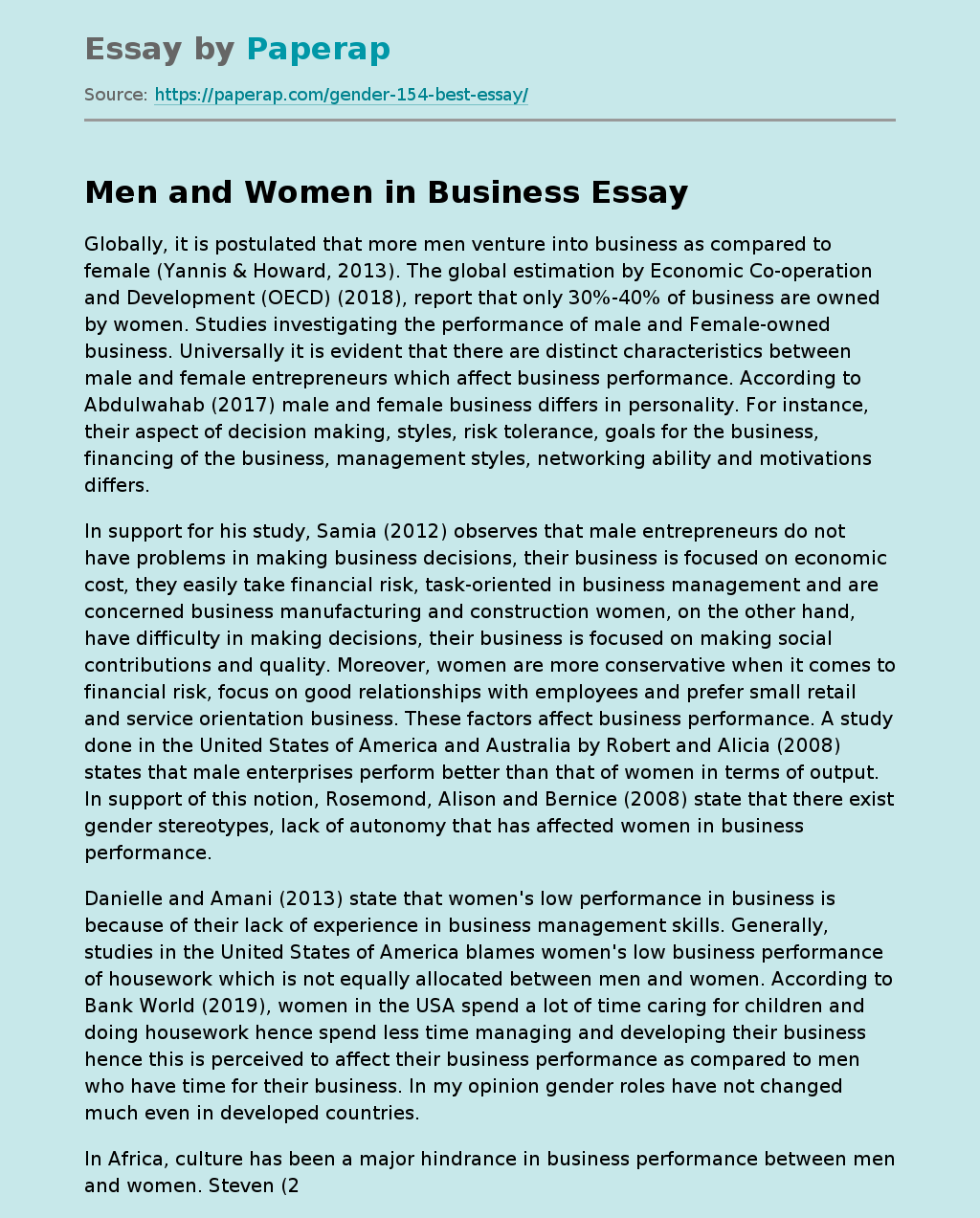Men and Women in Business
Globally, it is postulated that more men venture into business as compared to female. The global estimation by Economic Co-operation and Development (OECD) (2018), report that only 30%-40% of business are owned by women. Studies investigating the performance of male and Female-owned business. Universally it is evident that there are distinct characteristics between male and female entrepreneurs which affect business performance. According to Abdulwahab (2017) male and female business differs in personality. For instance, their aspect of decision making, styles, risk tolerance, goals for the business, financing of the business, management styles, networking ability and motivations differs.
In support for his study, Samia (2012) observes that male entrepreneurs do not have problems in making business decisions, their business is focused on economic cost, they easily take financial risk, task-oriented in business management and are concerned business manufacturing and construction women, on the other hand, have difficulty in making decisions, their business is focused on making social contributions and quality. Moreover, women are more conservative when it comes to financial risk, focus on good relationships with employees and prefer small retail and service orientation business.
These factors affect business performance. A study done in the United States of America and Australia by Robert and Alicia (2008) states that male enterprises perform better than that of women in terms of output.
In support of this notion, Rosemond, Alison and Bernice (2008) state that there exist gender stereotypes, lack of autonomy that has affected women in business performance. Danielle and Amani (2013) state that women’s low performance in business is because of their lack of experience in business management skills.
Generally, studies in the United States of America blames women’s low business performance of housework which is not equally allocated between men and women. According to Bank World (2019), women in the USA spend a lot of time caring for children and doing housework hence spend less time managing and developing their business hence this is perceived to affect their business performance as compared to men who have time for their business.
In my opinion gender roles have not changed much even in developed countries. In Africa, culture has been a major hindrance in business performance between men and women. Steven (2017) states that Africa is a highly patriarchal society and that culture dictates gender roles which constrain productivity and the profitability of women’s business. Rodr?guez-Modro?o (2015) concent that patriarchy in Africa limits women’s business growth. The scholar argues that women in Africa lack social investment and entrepreneurial skills because patriarchy imposes certain restrictions and men are unwilling to work under women.
Women’s involvement in economic activities is significant and should be supported. In Africa, women’s low participation in the community has affected their business performance. There is evidence that the majority of female-owned businesses do not perform as well as compared to that of male-owned businesses. A study conducted by Herring (2016) revealed that women venture a lot into domestic chores and unpaid activities, and the scholar also explained that in East Africa women’s businesses do not perform better as compared to that of men because they are concentrated in retail sales and services.
A study conducted in South Africa on Gender Differences in Self Employment Characteristics in Post-Apartheid by Steven (2017) revealed that women only join self-employment after becoming desperate job seekers, Steve in his study explains that women business lags due to domestic responsibility, lack of mobility and financial constraints. Steve findings are supported by Roho (2001) who states that majority women do not have access to formal borrowing as they do not own a collateral fixed asset which is dominantly owned by men, hence increasing their stock is a challenge.
Gender roles are an important aspect of business performance, In a study conducted in Uganda by Roho (2001) states that traditional expectations about the male gender in societal settings have not shifted significantly. Men are considered breadwinners, whereas women are expected to fulfil household duties and, more importantly, to care for the family. It is, therefore, appropriate to indicate that female business owners experience a dual burden daily which affect their business.
In Kenya, female business owners operating their own business enterprises are more likely to have lower motivation to achieve high performance, compared with their male counterparts, as their time has to be divided between work and home. This has a negative impact on womens entrepreneurial efforts, and more importantly, the ability to gain business-related experience, which is crucial for better firm performance.
Men and Women in Business. (2019, Dec 01). Retrieved from https://paperap.com/gender-154-best-essay/

